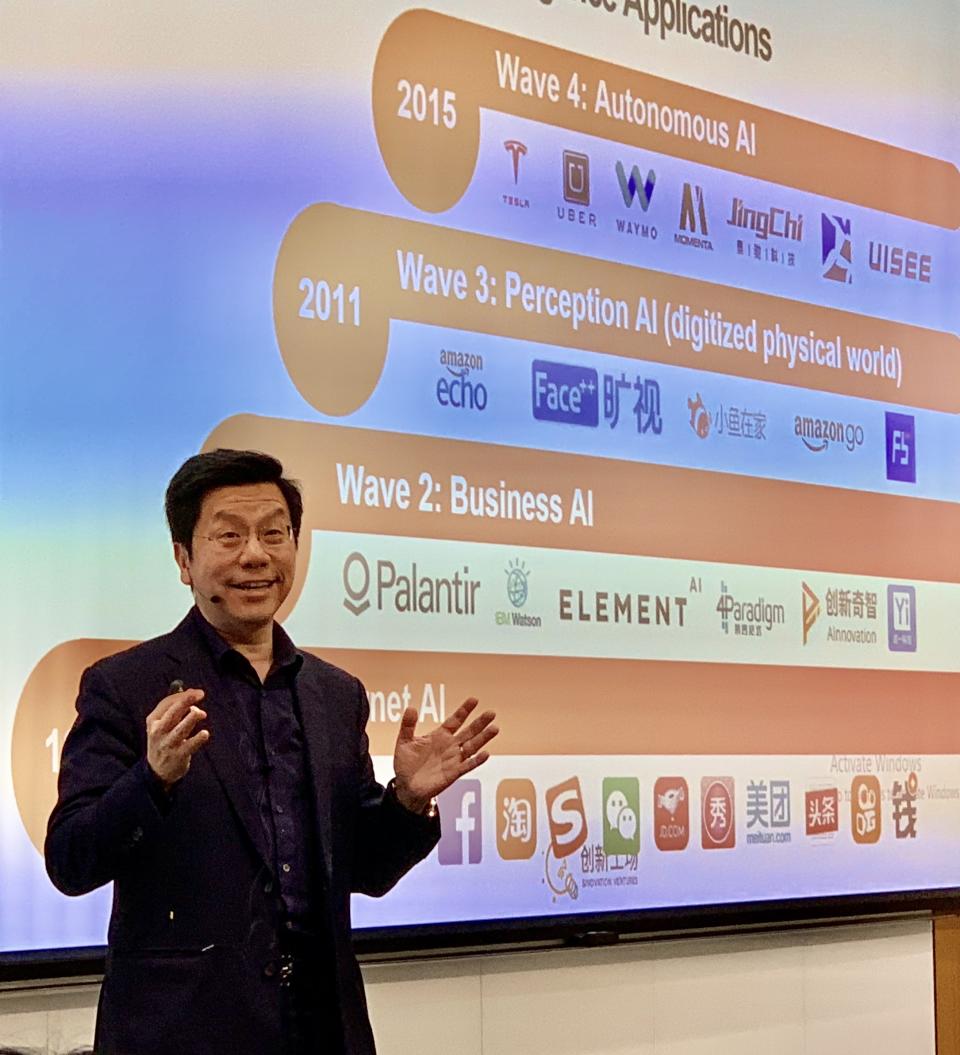Why China could win the ‘AI superpowers’ war against the US in just 2 years: AI expert Kai-Fu Lee

If artificial intelligence data were oil, then China is the new Saudi Arabia.
That’s how Kai-Fu Lee, former president of Google China, sees the future world order for business AI, predicting that China’s level of sophistication could eclipse that of the U.S. in as few as two years.
In a presentation at New York University’s Tandon School of Engineering Tuesday, Lee laid out theories from his new book, “AI Superpowers: China, Silicon Valley, and the New World Order,” predicting that China’s model for fostering new AI growth might prove superior to the U.S.
Lee’s rationale is based on the confluence of four distinct factors that he says currently operate more symbiotically in China than they do in the U.S.: abundant data, hungry entrepreneurs, AI scientists, and AI-friendly policy.
AI policy in the driver’s seat
“In China, we have a phrase that translates to ‘let the bullet fly,’” Lee said. “If it hits somebody, then regulate it.”
Lee says China’s techno-utilitarian environment creates a growth platform unbridled from legislative influences in the U.S. that can easily tap the brakes, and potentially hamstring efforts to capitalize on an industry expected to generate $15.7 trillion in global GDP by 2030.
Take self-driving vehicles, for example.
According to the National Conference of State Legislators, 29 U.S. states have enacted their own laws regulating autonomous vehicles. And governors in 10 states have issued executive orders curbing testing and use.
China, on the other hand, adopted national guidelines earlier this year that permit any city to perform tests on self-driving cars. The country has started engineering multi-tiered roads and entire cities tailored to incorporate driverless vehicles.
Lee says the U.S. remains “by far” ahead of China in terms of AI technology, yet China’s policy decisions and infrastructure spending will likely help it catch up.
“It’s something private companies can’t do,” he said.
Are Americans ready to hand over more personal data?
In Lee’s estimation, U.S. infrastructure and policy hurdles loom larger than privacy concerns for the success of homegrown AI.
No doubt, he says, Chinese consumers have been quicker to offer up personal information in exchange for utility and convenience. Use of peer-to-peer lending platforms, already considered mainstream in China and recently under increased regulatory scrutiny, require handing over a wealth of personal and behavioral data to the companies that run them.
Yet Lee says American consumers may not be the privacy hawks they’re characterized to be. Instead, he argues, American businesses aren’t probing deep enough into the value of their own data, meaning they’re not doing enough with the information on a per user basis.
“I think most Americans would be okay with [more privacy pervading] usages, but entrepreneurs aren’t going deep enough with those usages,” Lee said.
“How many people refuse to order food because of privacy?” Lee asks. “How many people refuse to ride Uber because of privacy, or refuse to use Apple pay because of privacy?”
Data is China’s AI trump card
Bottom line, according to Lee: Data is more important than algorithms, and that’s where China is king, as its internet population surpassed 800 million users this year compared to roughly 290 million internet users in the U.S.
Lee acknowledges that China’s ability to amass so much data came from copying AI technology born in Silicon Valley, though he insists Chinese engineers and entrepreneurs have evolved into innovators. Chinese businesses are building products and services at scales that cannot be copied, he said.
“This is the China approach. It’s not Steve Jobs, or SpaceX approach, but it works.”
So who will win AI superpower wars? It’s impossible to tell — unless the U.S. produces another well-funded Steve Jobs, according to Lee.
“Steve Jobs trumps everybody,” he said.
Alexis Keenan is a reporter for Yahoo Finance.
